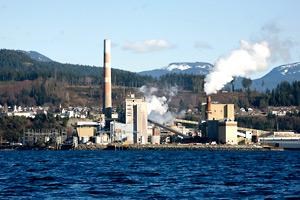UPDATED – Catalyst Paper Corporation president and CEO had five meetings with employees in Powell River on Thursday, January 19, to explain the company’s financial restructuring. The meetings gave Kevin Clarke the opportunity “to personally meet with all of the employees and give them the status of our bondholder deal and the requirements necessary to complete that deal,” he said. “The good news is that the Powell River employees have already supported it.”
Catalyst reached an agreement with bondholders, which is being implemented under the Canadian Business Corporation Act (CBCA), that will cut its debt by $315 million and reduce annual cash interest payments by $26 million. The plan would see bondholders take control of the company.
The other alternative is a filing under the Companies Creditors Agreement Act (CCAA), which Clarke said “is surely not an avenue we would pursue lightly, but it could happen. I think the employees were appreciative of that.”
Clarke told the Peak in an interview that Catalyst has “a tremendous workforce in Powell River, as we do in many of our other mills. They surely had lots of questions, which I did my best to answer. We had a good deal of retirees there, because the retirees would be affected with this one way or another.”
He had the opportunity to show employees that the decision affects not only them, but up to 10,500 other people, Clarke said. “We have retirees, we have, obviously, active employees and we have dependents on both of those groups. The good news is the people of Powell River work hard, they’re subject-matter experts, they’re cranking out the paper every day, while all the distractions of this process go forward.”
The company has received an initial court order under CBCA to begin a planned restructuring. As well, it is seeking protection under Chapter 15 of the United States’ bankruptcy code, used by foreign companies to protect their assets from creditors and shield them from lawsuits.
In a statement issued on Wednesday, January 18, Catalyst emphasized the Canadian court order is not a bankruptcy proceeding.
“The company is also seeking recognition of these proceedings with the US Court in order for the Canadian order under the CBCA to be recognized in the United States,” the release stated. “The company will continue to operate and satisfy its obligations to trade creditors, customers, employees and retirees in the ordinary course of business during this restructuring process.”
The company’s recapitalization plan would create a new board of directors and give voting control to its bondholders, which would own 99.5 per cent of the common shares. The remaining 0.5 per cent would be held by holders of Catalyst’s existing common shares.
The agreement is conditional on support of two-thirds of the 2016 noteholders and two-thirds of the 2014 noteholders by January 31. It must also be approved by the BC Supreme Court, the Toronto Stock Exchange and regulators.
As well, the plan is subject to new labour agreements with unions at Catalyst’s Canadian mills being ratified by the end of January. Locals at the Powell River and Port Alberni divisions have ratified the agreement, but Crofton union members have not accepted it.
Clarke said he has given the same presentation he gave in Powell River to both Port Alberni and Crofton employees.
Catalyst representatives are speaking to union officials in Crofton, Clarke said, “so it could be presented to the membership for a vote. That’s going on now and that process will take its normal course. I think everybody understands the timeframe is critical and we’re working like crazy to make sure that we complete this and get this over the goal line.”
He urged all employees to make sure they were dealing with the facts, Clarke added. “There’s speculation, there’s rumour mill, there’s all sorts of intrigue,” he said. “I told them if they read the Internet and the blogs surrounding it, please do it for their amusement and not for the facts.”
Clarke also said he told employees Catalyst doesn’t know who exactly the bondholders are. “We deal with their advisors,” he said. “The bondholders do not want to be restricted, because if they get any information that’s not public, they’re restricted in trading either equity or bonds that they own, so they surely don’t want to do that.”
Bondholders can trade in and out, Clarke said. “There’s no mystery, there’s no secret, but the bonds are held by insurance companies, mutual funds, pension funds, all sorts of different companies, bank investment funds, and they’re fluid instruments.”
The bondholders will be known when the “deal is papered," he said. "I don’t even know who they all are and I’m the CEO of the company. I understand the frustration of my employees, but I don’t know who they are.”
However, Clarke said he knows one company that is not a bondholder, Third Avenue Management. “I did clean that up for my employees. There was a conspiracy theory that our largest equity holder, who is taking a $375 million loss on their Catalyst investment as a result of this situation, had somehow gone in and was going to make some disproportionate profit on our bonds and that’s just not true.”



